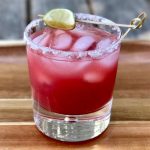 An appetizer usually made with vegetable or fruit juices over ice, or an iced drink made with liquor and flavored with fruits.
An appetizer usually made with vegetable or fruit juices over ice, or an iced drink made with liquor and flavored with fruits.
For etymologists, the Holy Grail of words is cocktail, a word that has enticed many bright-eyed scholars to squander their youth and research grants while seeking its origin, but has so far eluded the prying fingernail of discovery. Of the many explanations proposed for the name of this mixed drink, the most absurd is that it derives from Xochitl, the name of an Aztec princess who supposedly invented it; trailing this explanation in terms of implausibility is the suggestion that cocktail derives from kaketal, a West African name for the scorpion, and that it is so called because the drink, like the insect, has a “sting.” Somewhat more feasible is the notion that the drink gets its name from the French coquetier, meaning egg cup: an apothecary named Antoine Peychaud served a drink of brandy and bitters in such a cup after settling in New Orleans in 1795. This origin at least accords with the first appearance of cocktail in print in 1806. Around the same time, the word cocktail was also used as the name for any racehorse that is not a thoroughbred, that is, for a horse of mixed parentage; this equine term seems to have originated from such horses having their tails cropped, so they “cocked up,” whereas thoroughbreds’ tails were left uncut. The name of these “mixed” horses may have been transferred to the name of the mixed drink. About fifty other theories for the origin of cocktail have been proposed over the last hundred years, none of them fully convincing.
A concise libation composed of a medley of elements so meticulously amalgamated (via agitation or oscillation in a beverage shaker, often accompanied by fragmented ice) that no solitary taste asserts superiority.
Cocktails are a diverse array of non-alcoholic hors d’oeuvres presented at the inception of a feast. The most renowned varieties consist of piscine, fruity, and vegetable juices. Here are some specimen formulas.
